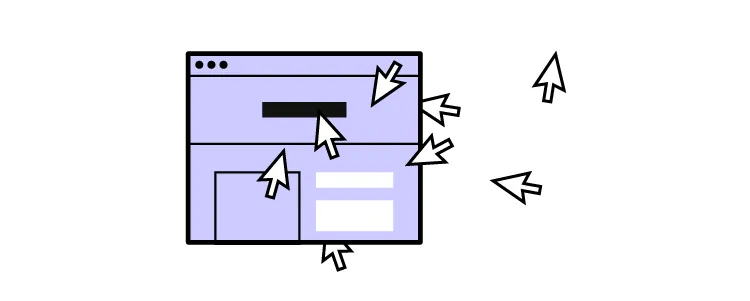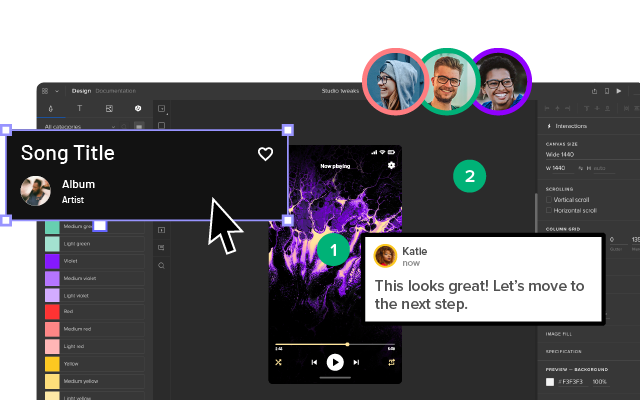What is UX Writing and Why You Need a UX Writer?

Nowadays, pretty much everyone knows what content writing is. But the same can’t be said about UX writing. And yet this new role within the product design team has become ever so important. So, what is UX writing, how does it fit into the design and product teams and what are the key principles of good UX writing? Read on to find out.
Boost your UX team’s efficiency with UXPin. This cloud-based prototyping tool enables seamless collaboration between UX writers and designers through real-time editing and design sharing. With support for importing real data into your prototypes, UXPin helps bridge the gap between design and development.
Experience UXPin’s capabilities firsthand with a free 14-day trial—no commitments required. Sign up for free.
Table of Contents
What is UX Writing?
UX writing – or user experience writing – is the process of creating user-friendly copy for all user-facing touchpoints, including user interface. And this is not just a decorative text. UX copy informs, guides, urges and helps users take action – and this only works effectively when it is created as a part of a formal product design process.
As great copy within an interactive UX design helps to create a great user experience – one of the keys for a successful product – no wonder it has become an important role on its own.
What Does a UX Writer Do?
UX writers write microcopy used throughout digital products – whether it is a piece of software, a web application, or a mobile app. These pieces of copy are menu labels, buttons, calls-to-action, confirmation and error messages, security notes, etc. UX writers create a copy in such a way that users understand what and why they should do in order to achieve a certain result.
To create a great UX copy, UX writers not only need to create consistent, error- and typos-free copy but also have a thorough understanding of the end-user experience of the product they’re writing for. They need to make it easy for users to take the path that leads towards a particular outcome in a logical, intuitive manner.
For a very long time, it was software developers and graphic designers who would write the microcopy for digital products. Back then UX writing was underestimated and considered a luxury. As a result, the microcopy within the product was often inconsistent and confusing for the user, not to mention that it was sometimes filled with grammar errors and spelling mistakes.
And that’s understandable – nobody can excel at everything, and software developers or designers aren’t an exception to this rule. Especially that they know the product inside out and it’s hard for them to empathize with users.
…and what does UX writer not do

The role of UX writer should not be confused with that of:
- technical writer – who does the technical writing and focuses on clarity and accuracy, not on user experience,
- content strategist – who plans content strategy, i.e. content on a bigger scale, and doesn’t necessarily write copy,
- information architect – who works on, well, information architecture, meaning that (s)he builds sustainable information structures and taxonomies,
- content marketing copywriter – who writes marketing copy that attracts leads, converts them into customers and helps to retain them); check the difference between copywriter and UX writer.
UX Writing in a Design and Product Team
UX writers are members of UX teams, and as such they’re expected to conduct or collaborate on conducting the UX research. UX copy and UX design teams work together to discover options that improve the functionality, usability, and accessibility of the final product. As a result, they’re able to both streamline the design process and develop better digital experiences that attract more users.
UX writers also work closely with product developers, focusing on missing logic or a confusing interface, thus influencing the final product that is being developed. UX writers also collaborate with other teams within the organization, such as marketing, legal, and business development, in order to ensure that copy is aligned to brand voice, strengthens product’s UVP, and doesn’t get the company in trouble.
Types of UX Content
The specific types of UX content vary depending on the digital product, but generally speaking the most common types of UX content include:
- First-time users onboarding
- Menu labels, form field labels and lists
- Buttons and call-to-actions (CTAs)
- Settings labels
- Contextual help and tooltips
- Confirmation messages
- Error messages
- Security notes
- In-product marketing (e.g. pop-up ads)
- Chatbot conversation scenarios
- Legal notices and disclaimers
UX Copywriting Principles
Great UX writing is all about clean, purposeful lines, making each word count. Superfluity and redundancy are its enemies. That’s why some people compare UX writing to… writing poetry! But great UX writers must also:
- Know not only what the product does but also how it improves the end user’s life and makes it easier. Having empathy for the end user and his or her needs and wants is the key to successful UX writing.

- Inform about what the product is capable of doing and guide users on how to do it in a logical, easy-to-follow manner.
- Look critically at the product flows, anticipate user questions, preempt their frustrations with proactive help and guide them through tasks.
- Be clear, concise, unambiguous, and – whenever necessary – break down complicated processes into easy to do steps. UX copy should only give the necessary or requested information at any given time.
- Use brand voice and, whenever possible, reinforce the product’s Unique Value Proposition (UVP) to help it stand out from the competition.
- Incorporate best content design principles based on research and always create copy in context, directly in a wireframing tool, that shows it with all the fonts, images, buttons etc. UX writers shouldn’t use Word documents or Excel sheets for their copywriting.
How to Use UXPin for UX Writing?
- Create Design Context: Use UXPin to design wireframes or prototypes, providing context for your content.
- Collaborate in Real-Time: UX writers can work directly within the design file, adding or modifying text while designers see updates instantly.
- Define Content Hierarchy: Utilize UXPin’s component system to create consistent content patterns for headers, buttons, and body text.
- Use Comments & Annotations: Leave comments to discuss content changes or ideas directly on the prototype.
- Prototype with Real Content: Import realistic data to simulate actual user scenarios, making the designs and content more aligned.
This approach enhances collaboration between UX writers and designers, leading to more cohesive and user-focused designs.
Summary
As you can see, having an experienced UX writer on board is the key to improve the overall quality of your product design. Remember that your user interface microcopy is there to help users accomplish their goals. And this is what ultimately will bring more customers to your digital product.

If you’re looking for ways to improve work within your UX team, consider giving UXPin a try. It’s a cloud-based design tool that makes it easy for UX writers and UX designers to collaborate in real-time. It even allows you to import real data into your designs!
See how it works with a free 14-day trial – with no commitment to buy!


